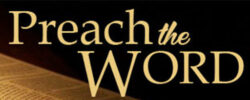The questions are based on the NET Bible.
CH 1: Blessing during Bondage in Egypt
Q1. How many members of Jacob’s family went down to Egypt?
Seventy.
The purpose of noting this number is to highlight how God grew them into a nation of 600,000. “Your ancestors who went down into Egypt were seventy in all, and now the Lord your God has made you as numerous as the stars in the sky” (Deuteronomy 10:22).
Q2. Who tried to suppress the growth of God’s people, and what was his method?
Through forced labor (verse 11)
By killing male babies (verse 16)
In verse 7, it mentions that the Israelites became fruitful and powerful. While it doesn’t explicitly say that God did this, the passage implies it. The world’s resistance to God’s work is shown in verses 9-10, where the Egyptians feared that if the Israelites grew too numerous, they might join their enemies and leave Egypt.
“Come, let us deal wisely” is a typical expression of human planning. Although the Egyptians employed various means to prevent the Israelites’ exodus, God’s will eventually prevailed.
Q3. Pharaoh attempted to reduce the number of Israelites, yet they multiplied even more. How was this possible? (Hint: verses 12, 17, 20-21)
By God’s intervention.
Q4. The midwives’ faith was shown in that they feared ( ) more than ( ).
God, Pharaoh.
Q5. What was Pharaoh’s final method to suppress the Israelites?
He commanded that every male child be thrown into the river.
CH 2: The Birth of the Deliverer
Q1. When they thought there is no hope for them, at the darkest moment in their life, God prepares a deliverer for His people. ( ) tried to anihilate all male babies of the Hebrews, ( ) used his vicious order to prepare the savior of his people in the house of the enemy of his people.
Pharaoh, God
God used human evil against Him to fulfill His good will. Pharaoh’s plan to suppress the Israelites ended up leading to the safe preparation of Moses as the deliverer. Similarly, God’s plan to elevate Joseph seemed thwarted when his brothers sold him into slavery, but eventually, through famine, they bowed to him. Likewise, Jesus’ death was intended by religious leaders to declare Him accursed, but it became the means through which the Holy Spirit was given, and His name was exalted above all.
Q2. Who brought Moses out of the river?
Pharaoh’s daughter.
Pharaoh asked him to be thrown to the river. His daughter rescued him.
Q3. Why did Moses need to flee from Egypt?
Because he feared for his life after killing an Egyptian.
Q4. Was Moses satisfied with his life? (v22)
No, he saw it as a life of exile.
CH 3: The Call of the Deliverer
Q1. How did God appear to Moses? (v2-6)
In a burning bush that was not consumed.
The burning bush is often interpreted by commentators as a symbol of Israel, which, though oppressed in Egypt, was not destroyed because God was with them.
In ancient times, the term ‘god’ was a common noun. It could refer to many gods. Therefore, it is very important to specify which god is being referred to. What distinguishes our God from other gods is not that He is called the ‘god of strength’ or ‘god of fire,’ but that He is called ‘the God of Abraham.’ God cannot be described by any other power or form but only as the God who appeared to Abraham and was experienced by Abraham. Our God is a personal God, and true communion with Him cannot occur without a personal relationship. Meeting Him, which means knowing Him, requires more than just hearing about Him; it necessitates a direct encounter, much like knowing a person requires meeting them rather than just hearing rumors.
Another attritbute that distinguishes our Gor from other gods was His holiness (verse 5).
Q2. What are the two reasons that the Lord saves the Israelites? (v7-10, v16-17)
Compassion for their suffering and faithfulness to His promise.
Q3. What was the Lord’s answer when Moses questioned God, “Who am I that I should go?”
“I will be with you” (verse 12).
The sign that God had sent Moses would be the Israelites worshiping at Mount Horeb after their exodus.
Q4. What are the names of God? (list at least two of them)
The God of Abraham, the God of Isaac, the God of Jacob (as God first revealed Himself)
I Am Who I Am (the name given to Moses when he asked for God’s name. However, God again affirmed Himself as the God of Abraham (verse 15))
The God of the Hebrews (this name was used to refer to God when speaking to Pharaoh. The term ‘Hebrew’ implies ‘those who crossed over’ and carries connotations of being foreigners or strangers, suggesting an image of a poor and oppressed people) (used when addressing Pharaoh).
CH 4: The Source of Sufficiency
Q1. Why did Moses say he couldn’t go? (Two reasons: verses 1-9, 10-12)
“The people won’t believe that the Lord appeared to me,”
and “I am slow of speech.”
Most refusals of God’s commands come from focusing on people rather than on God.
Q2. What is the purpose of the miracle that Moses would perform as in v2-5?
To prove that God had appeared to Moses.
Q3. What is God’s answer to Moses’ hesitance to go? (v12)
“I will be with you and teach you what to say.”
When Moses still hesitated, God appointed Aaron to speak for him. However, Aaron’s involvement later led to idolatry (Exodus 32).
Q4. What happened when Moses and his family were returning to Egypt according to God’s command? (v24-26)
God sought to kill Moses, but Zipporah saved him by circumcising their son.
According to Midianite customs, circumcision was performed before marriage, not on newborns as with the Israelites. Moses likely did not circumcise his son due to his Midianite family’s practices. As Moses was preparing to lead the Israelites, his lack of faith was exposed as a test of ‘trust and obedience’ to God. That Zipporah performed the circumcision suggests there was debate about this issue within the family.
This event highlighted Moses’ need to fully trust and obey God as he was about to lead Israel.
It is unclear when Moses sent his wife and children back to his father-in-law Jethro’s house, but during Moses’ mission of leading the Exodus, his wife and children did not accompany him and later reunited with him at Mount Sinai (Chapter 18).
CH 5: Opposition to the Plan of God
Q1. What was the Pharoah’s reason for not sending the Israelites? (v2)
He claimed not to know the God of Israel.
Pharaoh likely saw the God of the Hebrews as insignificant compared to the gods of Egypt, thinking of himself as the highest manifestation of the gods.
Q2. According to God’s command, Moses and Aaron tole Pharaoh’s to send the Israelites. But Pharaoh refused it. Then, what did he do the Israelites?
He increased the Israelites’ labor.
Q3. Please find verse in chapter 3 that God foretold about Pharaoh’s opposition.
Exodus 3:19
Q4. People complained to ( ), Moses complained to ( ) for the worsened situation caused by Pharaoh and for God’s not willing to deliver them. (v20-23)
Moses, God.
Had they remembered God’s promises, they wouldn’t have complained. God’s actions often differ from our expectations, yet always align with His word.
CH 6: The Assurance of Deliverance based on the Name, YHWH.
Q1. God answered Moses’ complaint (5:22-23). God had revealed His name as ( ) to Abraham, Isaac, and Jacob. But now God is going to reveal more about His name and His characters. God will reveal His name ( ) to the Israelites through this salvation. This name YHWH (some translation reads it ‘Jehovah,’ some reads it ‘LORD.’ YHWH is four consonants of the Hebrew word) means that God keeps His ( ) given to their ancestors and God frees them from their ( ) by Egyptians. (v2-6)
Almighty God, YHWH, covenant, life of slavery.
Q2. As the name of God, YHWH, implies, God Himself will surely deliver them. He called Abraham and promised the land by His own initiative. Now, He is about to accomplish His promise. How many times does God say, “I am the LORD (or Jehovah, or YHWH)” in v2-8? How many times do you read, “I will”?
Verses 2-5: “I am the Lord” (1 time), “I will…” (3 times).
Verses 6-7: “I am the Lord” (2 times), “I will…” (4 times).
Verse 8: “I will…” (2 times), “I am the Lord” (1 time).
Total: “I am the Lord” (4 times), “I will…” (7 times).
The name “God” emphasizes His divine attributes like “Creator” or “Almighty,” whereas YHWH (Jehovah) emphasizes His personal relationship with His people through covenant.
When we talk about a personal being, we consider two attributes: free will and relationality. God is free from everything and desires to grant freedom to us who were made in His image. In Exodus, God emphasizes the land of Egypt as the ‘land of slavery’. God emphasizes that He chose Abraham and the people of Israel by His own free will. God desired that the Israelites love and serve Him out of their own free will. He gave the Holy Spirit to free them from the law and to love Him freely. The freedom of a Christian is a very important and major theme.
Also, as being a personal being, God desires to establish relationships with other persons, and in those relationships, we see His faithfulness, specifically faithfulness to promises. We humans are not truly free, always bound by something, and unfaithful in relationships, but God is free and does not oppress anyone. He is also faithful. In Christ and through the guidance of the Holy Spirit, we inherit God’s freedom and faithfulness.
Q3. Even ( ) was discouraged at people’s unbelief and not willing to talk to Pharaoh. However, God would deliver them through this reluctant leader, Moses. Therefore, their deliverance was solely by God’s power and grace. (v9-12)
Moses.
It’s interesting that God gives no response to Moses’ complaint in verse 12.
Q4. Please find the family line from Levi to Moses. Levi – ( ) – ( ) – Moses and Aaron.
Kohath, Amram.
Moses’ genealogy is included to show that he wasn’t just a random figure but was chosen as part of God’s providence from the tribe of Levi. The repetition of the same passage in verses 10-12 and 28-30 emphasizes that despite Moses’ reluctance, God sent him, confirming that Moses was God’s appointed prophet.
Q5. Who were three sons of Levi?
Gershon, Kohath, and Merari.
CH 7: confirmation of the message & Plague One:water to blood
Q1. What is the purpose of the plagues? (v1-5)
To harden Pharaoh’s heart so that God could bring many plagues upon Egypt, making the Egyptians recognize that YHWH is the God of Israel, a God who keeps His promises and frees His people from oppression.
Q2. How old was Moses?
120 years old.
Q3. In order to prove it was God who sent Moses to Pharaoh, Aaron performed a miracle, what was it?
His staff turned into a serpent. Aaron’s staff swallowing the staffs of the Egyptian magicians signified that God’s power was greater than their gods.
Q4. Why did Pharaoh not listen to Moses even though he was miracles that Aaron performed? (v3-4, v8-13)
Because God hardened Pharaoh’s heart, and the Egyptian magicians performed the same miracle.
Q5. Summarize the first plague. The cause of the plague(v16-17), What happened, the response of Pharaoh (v22-23)
Cause (verses 16-17): Pharaoh refused to let God’s people go and worship in the wilderness, so God struck the Nile to show Pharaoh who YHWH is.
What happened: Aaron struck the water of the Nile, and all the water turned to blood. The fish died, and the river smelled foul.
Pharaoh’s reaction (verses 22-23): The Egyptian magicians replicated the miracle, so Pharaoh’s heart remained hardened, and he ignored the word of the Lord.
CH 8: Plague Two, Three, and Four: Frogs, Gnats, Flies
Q1. Summarize the second plague. – The cause of the plague(v2) – What happened – the response of Pharaoh (v8-15)
Cause (verse 2): Pharaoh refused to let God’s people go and serve Him.
What happened: Aaron stretched out his hand over the Nile, and frogs came up and covered the land. The magicians did the same.
Pharaoh’s reaction (verses 8-15): Pharaoh promised to let the Israelites go and sacrifice to the Lord. But when the frogs were gone after Moses prayed, Pharaoh hardened his heart again.
The ten plagues were a judgment against the various gods of Egypt and the values that believed in such gods
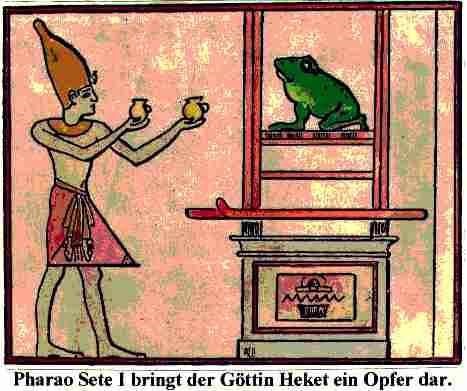
Q2. The third plague, the plague of gants came without any preannouncement to Pharaoh. What is their response?
The magicians acknowledged that this was the finger of God.
Q3. Summarize the fourth plague, the plague of flies. Why there was no fly in the region of Goshen? (v22-23) Pharaoh’s response (v25-27, v28, v30-31)
Why was there no plague in the land of Goshen? (verses 22-23)
God distinguished His people from Pharaoh’s people by sparing them from the plague.
Pharaoh’s reaction (verses 25-27, 28, 30-31):
He allowed the Israelites to sacrifice in Egypt. Then he permitted them to go into the wilderness but told them not to go too far. However, once the flies were gone, he hardened his heart again.
CH 9: Plague Five, Six, and Seven: Disease, Boils, and Hail
Q1. The plague of disease. The cause of the plague(v1-2)? What are two proofs telling that the disease comes from God’s power? (v4,5)
Pharaoh refused to let God’s people go and serve Him.
The disease did not affect Israel’s livestock, and it began at the exact time God specified.
Q2. Aaron threw dust into the air, and boils broke out on the Egyptians. Why did he do this in front of Pharaoh?
To demonstrate that this was God’s doing. The magicians couldn’t stand before Pharaoh, symbolizing that even their gods couldn’t protect Egypt from God’s judgment.
Q3. The plague of Hail. Why did the Lord not destroy all of Egypt at once? (verses 13-19)
To show His power and make His name known throughout the earth (verse 16).
Q4. How did the hail come? Where was there no hail? How could some Egyptians save their livestock?
The hail came when Moses stretched his staff towards the sky. There was no hail in Goshen. Those Egyptians who feared God’s word brought their livestock indoors (verse 20). The hail plague showed that God’s intention wasn’t complete destruction but rather salvation.
Q5. How did Pharaoh respond?
He admitted he had sinned and promised to let the people go, but once the hail ceased, Pharaoh and his officials hardened their hearts again.
Q4. In plagues 2 to 7, Pharaoh seemed to obey but then hardened his heart when the plague ended. Who hardened Pharaoh’s heart? Find supporting verses in chapters 8 and 9.
Exodus 8:15: Pharaoh hardened his heart.
Exodus 8:19: Pharaoh’s heart was hardened.
Exodus 8:32: Pharaoh hardened his heart.
Exodus 9:7: Pharaoh’s heart was hardened.
Exodus 9:12: God hardened Pharaoh’s heart.
Exodus 9:35: Pharaoh’s heart was hardened.
Pharaoh’s heart initially hardened by his own choice (Exodus 7:13), but as he continued, God confirmed and strengthened this hardness, allowing him to experience the consequences of his refusal.
We need to focus on the repeated expression, “as the Lord has spoken.” We might want to assign blame for Pharaoh’s stubbornness, but that is between Pharaoh and God. The Bible tells us ‘as the Lord has spoken.’ The lesson from this scripture is that we should not follow the example of Pharaoh (1 Samuel 6:6, Hebrews 3:15). We should not be judges of the Word, but rather obeyers of the Word.
CH 10: Plague Eight and Nine: Locusts and Darkness
Q1. What is the reason that the Lord hardened Pharaoh’s heart? (two, v1-2)
To show His power and to teach the Israelites to fear the Lord.
Q2. Pharaoh allowed the Israelites to leave after the locusts were threatened, but what condition did he set?
Only the men could go and sacrifice.
Q3. In verses 6 and 14, the author twice mentions, “There has never been such locusts before, nor will there ever be again.” What point is being made?
The locust plague was a unique and unprecedented act of God, meant to make His power known.
Q4. How many days were in darkness?
Three days.
Q5. When Pharaoh allowed the Israelites to leave, what condition did he impose?
He told them to leave their livestock behind, showing
CH 11: Plague Ten: Death
Q1. Before the Israelites left Egypt, they asked their neighbors for gold and silver items. What do you think made the neighbors give their treasures to the Israelites?
They took plunder as a symbol of victory over the Egyptians and their gods. God made them ask for gold and silver valuables from their Egyptian neighbors, and the neighbors willingly gave them up. In Exodus 3:22 and 12:36, the term “took” can also mean “plundered.” God wanted the Israelites to know that He is greater than any god in the world, and these valuables were later used to build the Tabernacle in the wilderness, although they also made a golden calf with it.
Q2. Why does the Lord kill the firstborns of Egyptians? (Ex 4:22-23)
Because Pharaoh refused to release God’s firstborn, Israel. God’s plan was to call Israel first and save the nations through them.
CH 12: The Institution of the Passover
Q1. On what day and month was Passover held? (v2-3)
On the 14th day of the first month in the Jewish calendar. God made this month the first month of their year.
Q2. They prepared a male lamb or goat that was (____) year(s) old for the Passover (____) days before. They examined it until the (____)th day to see if it had any defects. At sunset on the 14th day, they slaughtered the lamb or goat and put its (____) on the doorposts and lintel. They did not boil the meat but ate it (____). They hurriedly ate the meat that night.
1, 4, 14, blood, roasted
Q3. What was the sign that made the angel of God pass over the house of the Israelites?
Blood
Q4. What is the name of the festival that follows the Passover?
The Feast of Unleavened Bread
Q5. Why do they keep the feast of the Passover as their perpetual ordinance?
To remember (commemorate) it.
Q6. When God killed all the firstborn of Egypt, the Israelites were saved. What died instead of the firstborn of Israel?
A lamb or goat
Q7. Why did Israelite take unleavened bread when they left Egypt?
They didn’t have time (v39). Even Pharaoh and the Egyptians, who had blocked their exodus, gave them gold and silver to make them leave quickly, which was God’s work.
Q8. How long did the Israelites stay in Egypt from when Jacob and his family first went there until the Exodus?
430 years. God had told Abraham they would be enslaved for 400 years (Genesis 15:13), and they would return to Canaan in the fourth generation (Genesis 15:16).
Q9. What two ordinances were required to be part of the Israelite community? (v43-49)
Passover and circumcision. Even foreigners living among the Israelites could become God’s people through circumcision and Passover.
CH 13: Commemorate this day
Q1. The Lord asked the Israelites to keep the Feast of Unleavened Bread and the ordinance of the Firstborn. It was to remember the Lord’s deliverance. The Feast of Unleavened Bread was to remember God’s mighty hand for their salvation and to encourage them to have the ( ) of the Lord in their ( ). (v8-9) As for the ordinance of the Firstborn, they need to sacrifice the first male offspring of every womb to the Lord or ( ) it with another animal. Through this, they would remember God’s punishment on Pharaoh’s ( ) and salvation through redemptive sacrifice. (v14-15)
Law (or fear), hearts (or life), kill, hardness
Q2. Why did the Lord not lead the Israelites through the road of Philistine, a shortcut route?
They might have feared war and returned to Egypt (v17). This shows that God sometimes leads us through easier paths, especially when we are new believers, to avoid too strong hardship for baby Christians.
CH 14: Israel Saw the Hand of the Lord
Q1. The Lord led them to a place where they had no escape route except the sea. When Pharaoh heard this, he thought they were lost in the desert. Why did the Lord lead them this way? (v4)
To make the Egyptians know who God is. ‘They will know that I am the Lord.’ He acts according to His own will, and nothing can oppose the Lord, who saves His people from the strongest armies. All other gods are served by humans and act passively according to their demands, favoring those who bring offerings, not His chosen people. Their power is not absolute and they must compete or cooperate with other gods. ‘They will know that I am the Lord.’ What a remarkable declaration!
Q2. What did the Israelites say when they saw the Egyptian chariots approaching?
“We are going to die here!” (v11)
Q3. What did Moses say to them? (Write v13)
“Do not be afraid. Stand firm and you will see the deliverance the Lord will bring you today. The Egyptians you see today, you will never see again.”
Q4. How did God delay the Egyptian chariots while the Israelites crossed the sea?
The pillar of cloud moved behind them, turning the night into darkness between the Egyptians and Israelites.
Q5. What did the Egyptian soldiers say when they were trapped in the middle of the sea? (v25)
“The Lord is fighting for them against Egypt!”
Q6. As we follow God’s guidance, we might encounter unexpected difficulties in life. What is the purpose of these challenges? (v4, v18, v31)
To know, fear, and trust the Lord.
CH 15: The Song of Triumph
Q1. “(____) is my strength and my song. He has become my (____).”
The Lord, salvation
Q2. From this song, we see that God’s salvation comes from two attributes: His (____) to cast down those who oppose Him and His (____) to lead the redeemed people.
Majesty (His greatness and power to judge), lovingkindness
Q3. What is the ultimate goal of our salvation? (v17-18)
To dwell in God’s presence
Q4. What lesson did God want to teach them through the bitter waters at Marah? (v26)
The Lord is our healer.
CH 16: The Lord fed His people
Q1. When they were hungry they complained to Moses. “If only we had died by the hand of ( ) in Egypt, when we sat by the pots of ( ), when we ate ( ) to the full, for you have brought us out into this wilderness to kill this whole assembly with ( ).” They valued the satisfaction of their flesh more than being God’s people.
The Lord, meat, bread, hunger
Q2. How did God respond to their complaints?
He promised to rain down bread from heaven, but only enough for each day to test whether they would follow His law. This was to reveal God’s goodness and their lack of trust, so they would understand.
Q3. How many times does it mention that the Israelites grumbled and complained?
Eight times (verses 2, 7, 8, 9, 11).
Q4. What were the two rules they had to follow when gathering manna?
Gather only enough for one day. Do not go out on the Sabbath.
Q5. Why did God impose such restrictions?
To test whether they would trust Him and to train them to rely on Him.
Q6. What was the purpose of having some manna stored in a jar? (v32-34)
To remind future generations that God fed them with manna in the wilderness, something they had never seen before.
CH 17: God Provides Water and Victory in Battle
Q1. Why did they complain this time? (v3)
They were thirsty and accused Moses of leading them into the wilderness to die of thirst.
Q2. Why did God command Moses to make the elders see water from the rock? (v5-7)
To make them aware of God’s presence among them. It was not Moses who led them into the wilderness, but God Himself, and it was not to destroy them that He led them into the wilderness, but to show them His purpose
“Moses did so in plain view of the elders”
Q3. Who gave them victory in battle, and what did Moses do to gain God’s strength?
God (v15). Moses prayed for God’s help.
CH 18: Jethro’s Visit and Moses’ Work
Q1. Who did Jethro bring when he visited Moses?
Moses’ wife Zipporah and his two sons, Gershom and Eliezer.
Q2. Where does it say Jethro heard of God’s deeds for Israel? What was Jethro’s reaction?
Verse 8. Jethro rejoiced, praised God, offered sacrifices, and shared a meal with Israel’s elders.
Q3. What was Jethro’s reaction to Moses judging the people’s disputes? (v17)
He said it was not good.
It contrasts to the phrase ‘all the good things’ that God does. The author wants to emphasize that only God is good, and that the history of the Exodus was solely the work of God.
Q4. What qualities should a leader have? (v21) Why? (v15, 19, 23)
They should be capable = fearing God. They should be trustworthy = hating dishonest gain. They should lead the people according to God’s will, bring the people’s cases to God, and ensure Shalom of God for the people.
CH 19: Israel at Mount Sinai
Q1. How long did it take them to reach Mount Sinai after leaving Egypt? (Hint: They left on the 14th of the first month)
Around 45 to 60 days, arriving on the first day of the third month.
Q2. What was God’s purpose in showing them His power and care? (v5-6)
So that they would obey His voice and keep His covenant, becoming a holy nation and a kingdom of priests to bless all nations.
Q3. God descended in a cloud and spoke with Moses so the people would believe He sent Moses. What did the people need to do to prepare for God’s descent? (v10-11, 22)
They had to consecrate themselves and wash their clothes.
Q4. What were the signs and sounds when God descended on Mount Sinai? (v16-19)
Thunder, lightning, a thick cloud, a very loud trumpet sound, smoke, fire, and trembling.
Q5. Why could Moses and Aaron go up the mountain, but the people could not?
Not because they were holy, but because God chose them. The people were required to consecrate themselves to recognize their sinfulness and God’s holiness.
CH 20: The Ten Commandments
Q1. On what basis does God have the right to give them the Ten Commandments? (v1)
He brought them out of Egypt, out of the house of slavery.
Q2. What happens if we love something more than God? (v5)
We experience God’s jealousy.
Q3. Why does God command the Sabbath? (v8-11)
Because He created for six days and rested on the seventh, blessing and making it holy.
Q4. How did the people react when they saw God speaking to Moses amidst thunder, cloud, and fire? (v19-20)
They were afraid and asked Moses to speak to God on their behalf because they feared direct communication with God. This reveals three reactions to God: indifference (from those who don’t know God), fear (from those who experience God’s power but don’t understand His heart), and worship and trust (from those who know God’s power is for their benefit).
Q5. Recite the Ten Commandments.
You shall have no other gods before Me.
Do not make any idols.
Do not misuse the name of the Lord.
Remember the Sabbath and keep it holy.
Honor your father and mother.
Do not murder.
Do not commit adultery.
Do not steal.
Do not give false testimony against your neighbor.
Do not covet your neighbor’s property.
CH 21: Laws Concerning Life and Property
Q1. If you buy a Hebrew servant, how long will he serve you? After how many years will he go free?
Six years of service, and he will go free in the seventh year.
Q2. If a man accidentally kills his neighbor, what punishment would he face?
He must flee to a city of refuge, where he stays until the high priest dies and his innocence is confirmed.
Q3. If a man injures his neighbor, what must the offender do?
Compensate for the loss until the injured person recovers.
Q4. If an ox gores someone to death, and the owner knew the ox was dangerous but took no precautions, what penalty would the owner face? (Three cases)
If the victim was a free person: the owner must be put to death or pay a ransom.
If the victim was a minor: the owner must pay a ransom.
If the victim was a slave: the owner must pay 30 shekels of silver.
CH 22: Laws on Property and Morality
Q1. If a thief is caught and struck down, under what circumstance would the homeowner be held responsible for the thief’s death?
If the thief is killed during daylight, the homeowner is held responsible.
Q2. If someone steals an ox, what is the restitution if the thief is caught? (Two scenarios: If the ox is found alive, or if it has been killed or sold)
If the ox is found alive, the thief must repay double. If the ox has been killed or sold, the thief must repay five oxen for one ox, and four sheep for one sheep.
Q3. How should disputes that have no witnesses or evidence be resolved? (v11)
By bringing the matter before God and taking an oath to settle the dispute.
Q4. Why does God command Israel to follow these laws? (v23, v27, v31)
God is just toward the vulnerable (v23), merciful to the poor (v27), and Israel is to be a holy people, reflecting God’s character to others.
CH 23: Justice and Worship
Q1. According to God’s Word, what should you do if you find your enemy’s lost animal?
You must return it to your enemy, even if they hate you.
Q2. Why does God command the observance of the Sabbath? (v12)
So that the working animals and servants may rest as well.
Q3. What are the three festivals Israel is commanded to celebrate each year? (v14-16)
Passover & Feast of Unleavened Bread, Feast of Weeks (Harvest Festival or Pentecost), and Feast of Ingathering (Feast of Tabernacles).
Q4. Before entering the Promised Land, God gave them three specific instructions: 1) God would send (____) to protect them and lead them to the land, and they must (____) him, for God would be an (____) to their enemies. 2) They must not (____) the gods of the land but must only worship the Lord, who will (____) their lives with blessings and make sure nothing is lacking. 3) God would fill the people of Canaan with (____) of the Israelites, but He would not drive them out all at once, so Israel would temporarily live alongside them. However, they were warned not to make any (____) with them.
An angel, obey, enemy; worship, bless; fear, treaties.
CH 24: God Confirms His Covenant
Q1. True or False questions:
– Moses, Aaron, Nadab, Abihu, and 70 elders went up the mountain and saw God. (True or False)
– Moses wrote down the words of the covenant. (True or False)
– They built an altar and set up twelve pillars representing the twelve tribes. (True or False)
– After offering sacrifices, Moses sprinkled blood on the altar and on the people. (True or False)
– The people said, “We will obey everything the Lord has said.” (True or False)
– They saw God and ate and drank before Him. (True or False)
– Moses, Aaron, Nadab, Abihu, and 70 elders went up the mountain and saw God. (True or False)
– Moses wrote down the words of the covenant. (True or False)
– They built an altar and set up twelve pillars representing the twelve tribes. (True or False)
– After offering sacrifices, Moses sprinkled blood on the altar and on the people. (True or False)
– The people said, “We will obey everything the Lord has said.” (True or False)
– They saw God and ate and drank before Him. (True or False)
True, but Moses alone was allowed to come close.
True.
True.
True.
True.
True.
Q2. After confirming the covenant, why did Moses go back up the mountain, and how long did he stay?
To receive the stone tablets with the commandments. He stayed for 40 days and nights.
CH 25: The Tabernacle’s Sacred Items
Q1. What were the three items in the Tabernacle (Holy Place)? Look at the picture to find them.
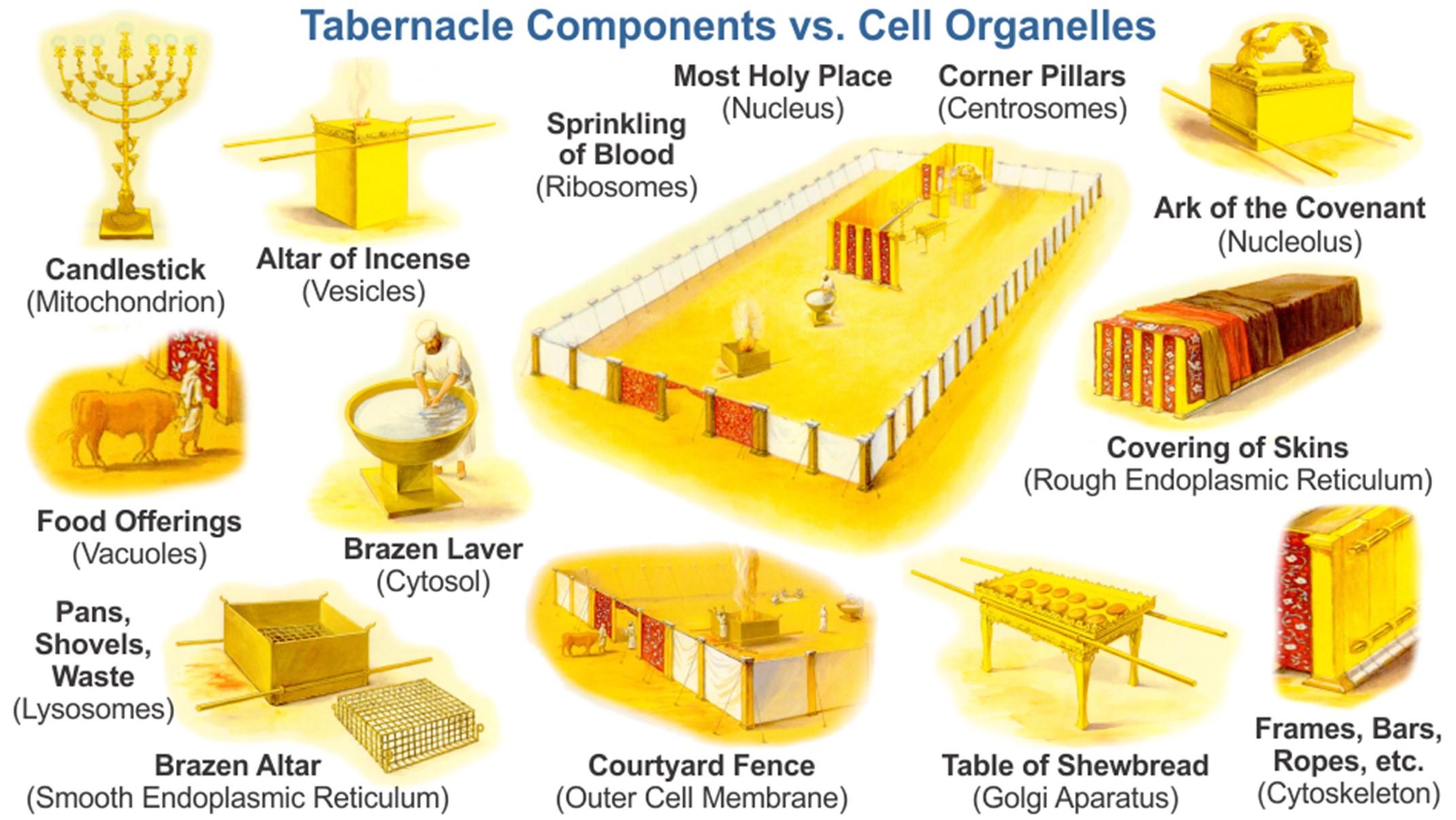

The Ark of the Covenant (in the Most Holy Place), the Table for the Bread of the Presence, the Lampstand, and the Altar of Incense (mentioned later in Chapter 30).
Q2. Where did God meet with His people? (v22)
Above the atonement cover (mercy seat) on the Ark of the Covenant.
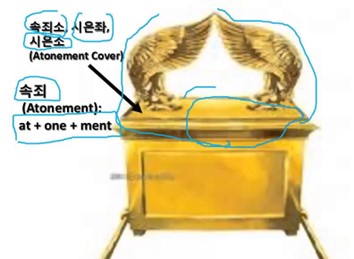
Q3. How many lamps were on the lampstand?
Seven lamps.
See which one is the correct picture of the lampstand?
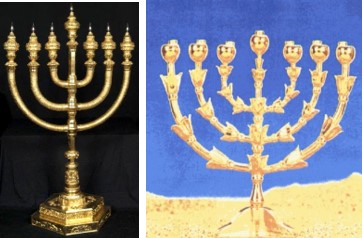
Right one! God commanded Moses to make it just as He had shown him on the mountain. Creating images and forms must be done with great care and according to the guidance of God
CH 26: The Tabernacle’s Construction
Q0. The Tabernacle was a portable dwelling place for God. Chapter 26 provides detailed instructions for making the curtains that cover the Holy Place (or Sanctuary) (vv. 1-14), as well as the frames and bars used to construct the walls of the Sanctuary (vv. 15-30). It also describes the making of the veil and the entrance curtain (vv. 31-37).
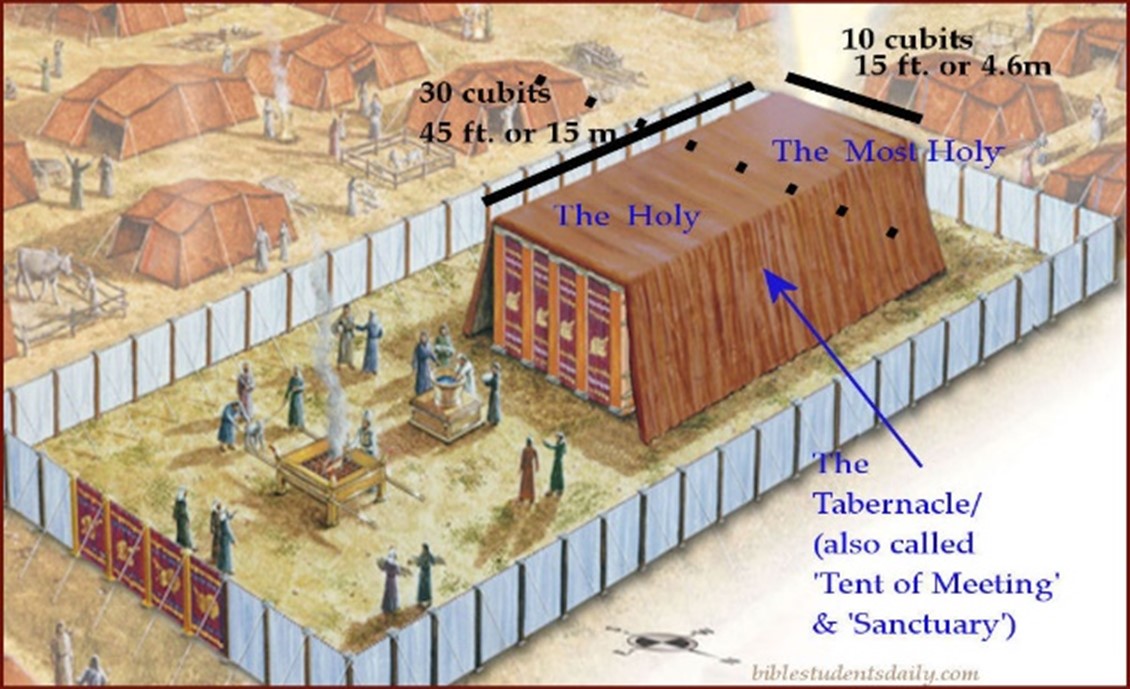
Q1. The Tabernacle was covered with four layers of curtains and coverings. Find the verses that describe each layer.
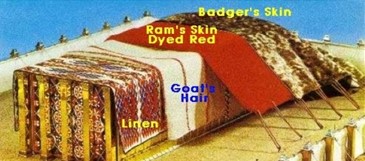

Verses 1, 7, 14.
Q2. The Tabernacle was covered by four layers of fabric. The first layer was 28 cubits by 40 cubits, composed of ten curtains
joined together in two sets of five. What were the dimensions of the second layer?

joined together in two sets of five. What were the dimensions of the second layer?

30 cubits by 44 cubits.
Q3. How many frames (wooden panels) and bases (sockets) were used to construct the walls of the Tabernacle? (v18-25)
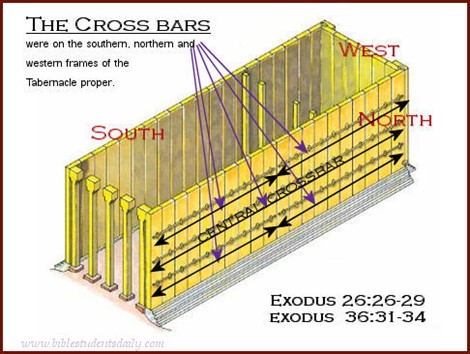

48 frames and 96 silver bases.
CH 27: The Altar and Courtyard
Q1. What were the dimensions of the altar?
5 cubits by 5 cubits by 3 cubits high (7.5 feet x 7.5 feet x 4.5 feet).
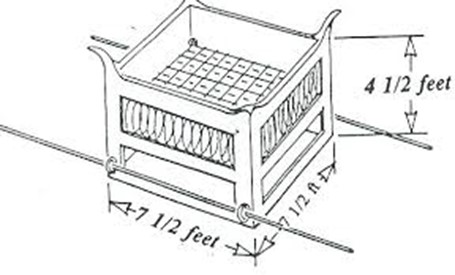
Q2. What were the dimensions of the Tabernacle’s courtyard?
100 cubits by 50 cubits (150 feet by 75 feet).

CH 28: The Priestly Garments
Q1. How many stones were inscribed with the names of Israel’s 12 tribes?
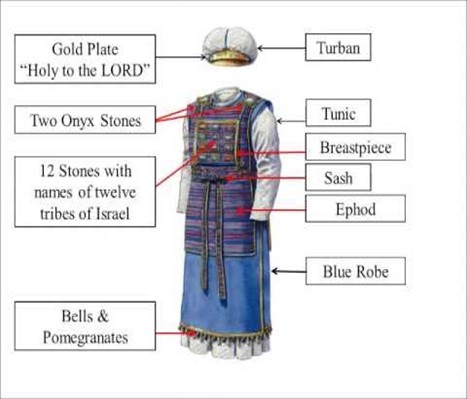

Fourteen: two onyx stones with six tribes’ names each on the shoulders, and 12 gemstones on the breastplate, one for each tribe.
Q2. Why were the names of the 12 tribes engraved on the stones? (v12, 29)
To remind the high priest that he represents the twelve tribes before God.
Q3. What was placed inside the breastpiece (the breastplate of judgment)? (v30)
The Urim and Thummim
Urim is similar to the Hebrew word ‘Ur’ meaning light, and Thummim refers to the Hebrew word meaning completeness. This indicates that when approaching God, one should do so with the light of the Word (Urim) to examine oneself so that there is nothing objectionable in one’s conscience, and with the mindset of being complete (Thummim). Urim and Thummim were used in other parts of the Bible to discern God’s will, similar to casting lots. It is worth considering whether this was indeed the method God desired. Indeed, it seems that when people asked for God’s will in this way, God sometimes responded through Urim and Thummim.
Q4. What was written on the gold plate on the high priest’s forehead? (36)
Holiness to the Lord
Q5. Why did they wear linen undergarments? (42-43)
To cover their nakedness
CH 29: Consecration of the Priests
Q1. Where were the young bull and the two rams slaughtered for the ordination of Aaron and his sons as priests?
At the entrance to the Tent of Meeting.
Q2. Match the sacrifices with their proper actions:
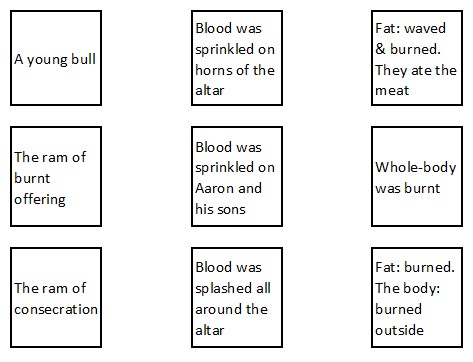

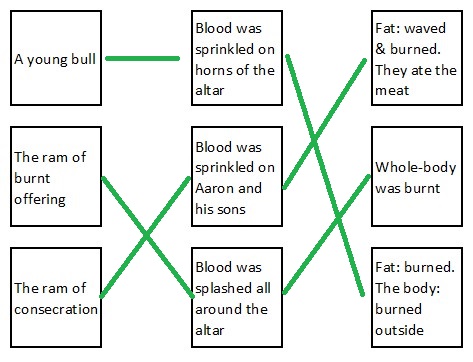
Q3. How many days were required to consecrate the altar?
Seven days.
Q4. “For seven days, make atonement for the altar and consecrate it. Then the altar will be most holy, and whatever touches the altar will be (____).”
Holy. The altar would have the power to make things holy, just as Jesus, in His holiness, made sinners clean rather than becoming defiled by them.
Q5. How many lambs were offered daily to the Lord?
Two lambs, one in the morning and one in the evening.
Q6. What was the purpose of consecrating the Tabernacle and the priests? (v45-46)
So that God could dwell among His people as their God, fulfilling the purpose of Exodus: to be their God. Similarly, the purpose of our worship and spiritual lives is to realize that we were saved for the work of God’s kingdom.
CH 30: The Altar of Incense and Other Instructions
Q1. Where was the altar of incense placed?
In front of the curtain that shielded the Ark of the Covenant.
Q2. Why did all Israelite males over 20 years old have to pay a half-shekel?
It was a ransom for their lives to protect them from God’s wrath while He dwelled among them.
Q3. What was the punishment for using the sacred incense for personal purposes?
The person would be cut off from their people.
CH 31: Bezalel, Oholiab, and the Sabbath
Q1. To help construct the Tabernacle and its furnishings, God appointed Bezalel and Oholiab. What did God specifically do for them? (v2-6)
God filled Bezalel with the Spirit of God, giving him wisdom, understanding, knowledge, and all kinds of skills to craft everything needed. Oholiab was appointed as his helper to assist in the work.
Q2. What were their roles in building the Tabernacle? (Moses, Bezalel, Oholiab)
Moses: Received the instructions from God and passed them on.
Bezalel: Designed the intricate parts of the Tabernacle (due to his wisdom, understanding, and craftsmanship).
Oholiab: Assisted Bezalel in executing the designs and crafting the items.
Q3. What was the sign of the covenant between God and Israel that set them apart? (v13, v17)
The observance of the Sabbath. Today, we might consider how our faith is signified in our lives as a reflection of being God’s chosen children.
CH 32: The Sin of the Golden Calf
Q1. The Israelites wanted a god for themselves and told Aaron, “Make us (____) that will go before us.” They sought a god to fit their needs and desires.
god (idol). When we pursue God only for our purposes, we risk distorting His Word to suit ourselves. Initially, we may come to God with our problems, but after hearing the gospel and accepting the Lord, we should listen to His purposes for our lives as a sign of faith.
Q2. What form did the idol take, and what did they say about it?
It was a golden calf. They claimed that this calf was the god that brought them out of Egypt, mirroring one of the gods they knew from Egypt (such as Hathor, an Egyptian goddess symbolized by a cow).
Q3. How did God respond to their sin?
God wanted to destroy them for their disobedience and rebellion.
Q4. What two reasons did Moses give to plead for God’s forgiveness? (v12-13)
For the sake of God’s glory (so that the Egyptians would not claim God brought them out to destroy them) and by reminding God of His covenant with Abraham, Isaac, and Jacob.
Q5. When Moses saw their idolatry firsthand, how did he react? (v19-20)
He was so angry that he smashed the stone tablets and destroyed the golden calf.
Q6. How did Aaron lie about his role in making the idol? (v4, 24)
He claimed that he simply threw the gold into the fire, and the calf “just came out,” downplaying his responsibility in molding it.
Q7. Which tribe stood with the Lord and carried out judgment on the idol worshippers?
The tribe of Levi.
CH 33: Moses Prays for God’s Presence
Q1. The Lord reassured the Israelites that He would give them the Promised Land, but they were distressed. Why? (v2-3)
God said He would not go with them because they were a “stiff-necked” people, and His presence would consume them. They grieved at the thought of God not being with them.
Q2. Why did God say He would not go with the Israelites? (v5-6)
Because of their stubbornness. He commanded them to remove their ornaments (likely because they were linked to idolatry).
Q3. What special favor did God grant Moses? (v11)
God spoke with Moses face to face, as one speaks with a friend.
Q4. What was Moses’ request to the Lord? (v15)
Moses asked that God’s presence go with them into the Promised Land; otherwise, he didn’t want to go. Moses prioritized God’s presence over the material blessings of the land.
Q5. What distinguished Israel from other nations? (v16)
The presence of the Lord with them. This was the unique mark of God’s chosen people, just as today, Christians are recognized by God’s presence and love among them.
Q6. When Moses asked to see God’s glory, what did God do?
God allowed Moses to see His “back” but shielded Moses from His face by covering him with His hand, as no one can see God’s face and live.
Q7. Complete the phrase: “I will have (____) on whom I have (____), and I will have (____) on whom I have (____).”
Mercy, mercy, compassion, compassion.
CH 34: The New Stone Tablets and Covenant
Q1. How does God describe Himself in verses 6-7? Compare this with Exodus 20:5-6.
God describes Himself as “merciful and gracious, slow to anger, abounding in steadfast love and faithfulness, keeping steadfast love for thousands, forgiving iniquity, transgression, and sin.” In Exodus 20:5-6, He is also described as a “jealous God, punishing the children for the sin of the parents.”
Q2. What did God promise to do for the Israelites? (v11)
Drive out the Canaanite nations before them.
Q3. Why were they forbidden from making a covenant (treaty) with the Canaanites? (v12-17)
Such treaties would become a trap for them, leading them to participate in Canaanite idolatry and worship false gods.
Q4. What were the three festivals they were to celebrate each year?
The Feast of Unleavened Bread (Passover), the Feast of Weeks (Pentecost), and the Feast of Ingathering (Tabernacles).
Q5. Why did Moses cover his face with a veil?
His face shone with the glory of God after speaking with Him, and the people were afraid to come near.
CH 35: Willing Workers
Q1. What was the punishment for working on the Sabbath?
Death. Even while constructing the Tabernacle, they were to keep the Sabbath.
Q2. The people offered their materials and skills to build the Tabernacle. Find the verses that support these statements:
God gave them willing hearts: Verses 5, 21, 22, 29.
They used their talents to serve: Verses 10, 25, 35.
They brought the materials they had for the construction: Verses 5-6, 22, 24, 29.
CH 36: Building the Tabernacle
Q1. Who was responsible for overseeing the construction work?
Bezalel and Oholiab.
Q2. The Tabernacle’s covering was made by connecting ten curtains. What was the total size? What about the goat hair covering made by connecting eleven curtains?
First covering: 42 feet by 60 feet (28 cubits by 40 cubits).
Goat hair covering: 45 feet by 66 feet (30 cubits by 44 cubits).
Q3. How many wooden frames were used for the Tabernacle’s walls?
Forty-eight frames.
CH 37: The Tabernacle’s Furnishings
Q1. Bezalel made the Ark of the Covenant, its cover (the mercy seat), its four rings, and two poles. What materials were used?
Ark: Acacia wood, overlaid with pure gold.
Cover: Made of pure gold.
Rings: Cast of gold.
Poles: Acacia wood, overlaid with gold.
Q2. What was the purpose of the poles? (v4, 14)
To carry the Ark.
Q3. The Lampstand was made of pure gold. How much did it weigh?
One talent of pure gold (approximately 75 pounds).
Q4. What four items were placed in the Tabernacle?
The Ark of the Covenant, the Table for the Bread of the Presence, the Lampstand, and the Altar of Incense.
CH 38: The Courtyard and Its Furnishings
Q1. What were the dimensions of the bronze altar, and what was it made of?
5 cubits by 5 cubits by 3 cubits high (7.5 feet x 7.5 feet x 4.5 feet), made of acacia wood and overlaid with bronze.
Q2. What were the dimensions of the courtyard?
100 cubits by 50 cubits (150 feet by 75 feet).
Q3. How much gold, silver, and bronze were used to construct the Tabernacle?
Gold: 29 talents and 730 shekels (over 1 ton).
Silver: 100 talents and 1,775 shekels (about 4 tons).
Bronze: 70 talents and 2,400 shekels (about 2.5 tons).
CH 39: The Priestly Garments
Q1. What colors were used for the ephod?
Gold, blue, purple, and scarlet.
Q2. Where were the names of the 12 tribes inscribed? (Two places)
On the onyx stones on the shoulders of the ephod and on the gemstones of the breastplate.
Q3. Name the parts in the picture. (Fill the blanks)
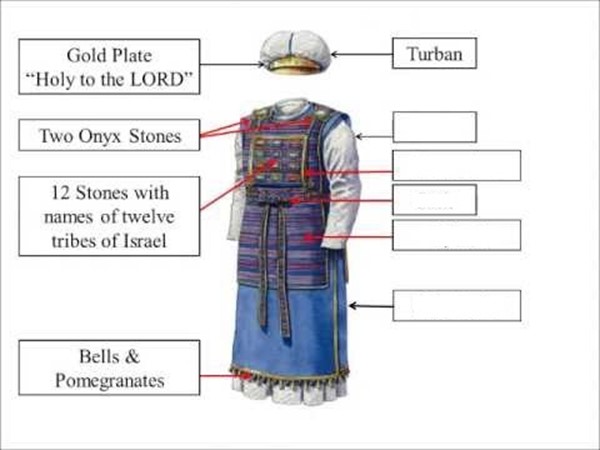


CH 40: The Tabernacle Completed and Dedicated
Q1. On what date was the Tabernacle set up?
The Tabernacle was set up on the first day of the first month of the second year after leaving Egypt (Exodus 40:17).
Q2. What happened when the Tabernacle was completed?
A cloud covered the Tent of Meeting, and the glory of the Lord filled the Tabernacle so fully that Moses could not enter.
Q3. Name the items in the Tabernacle from the image provided (items 1 through 5):
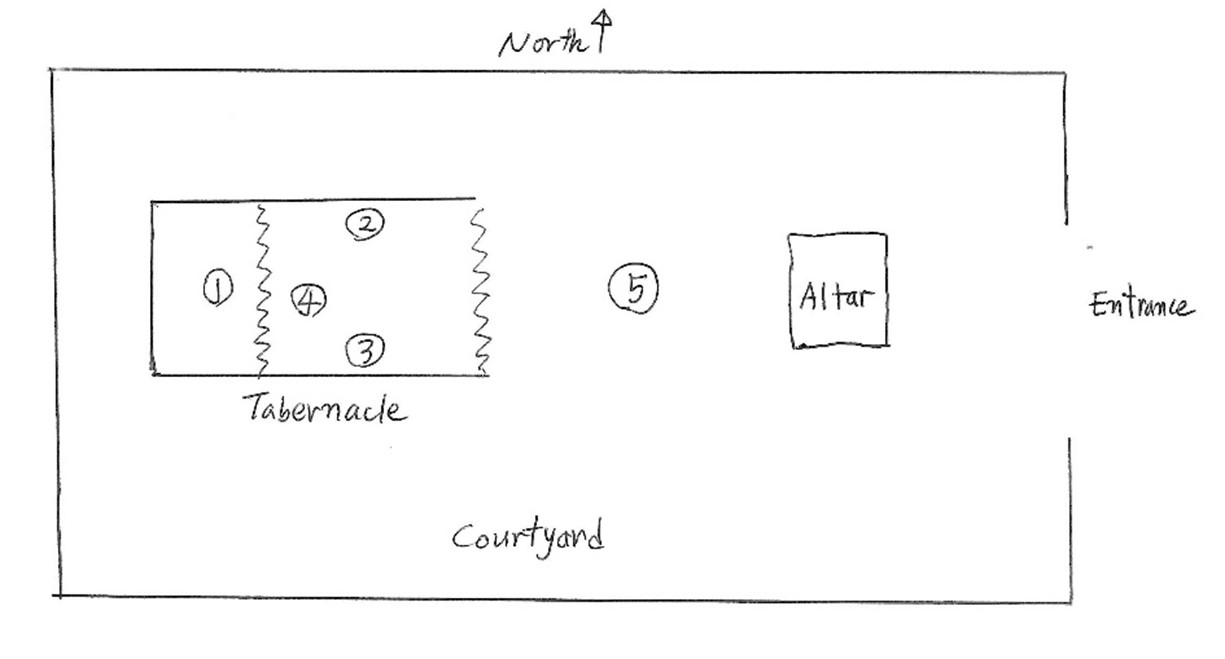

1 = Ark of the Covenant, 2 = Table for the Bread of the Presence, 3 = Lampstand, 4 = Altar of Incense, 5 = Basin (Bronze Laver).
Q4. True or False statements:
Moses alone set up the Tabernacle
Moses couldn’t enter the Tabernacle because of the Lord’s glory
Moses alone set up the Tabernacle
Moses couldn’t enter the Tabernacle because of the Lord’s glory
ANS: False, True
With the completion of Exodus, the narrative showcases God’s faithful provision for Israel, from their liberation to the establishment of a place where His presence could dwell among them. Each chapter highlights key aspects of worship, obedience, and covenant relationships, emphasizing God’s desire for holiness and His people’s role in reflecting His nature to the world.
